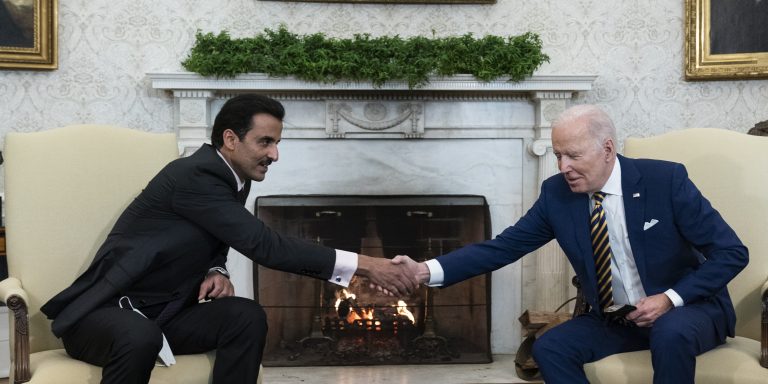INTELBRIEF
February 2, 2022
IntelBrief: Qatar Leader Visits United States amid Ukraine Crisis

Bottom Line up Front
- Qatar’s Emir, Sheikh Tamim bin Hamad Al Thani, visited Washington on January 31 primarily to discuss cooperation against any Russian cutoff of natural gas supplies to Europe.
- The supply of additional Qatari natural gas to Europe would require Qatar to interrupt long term supply contracts with its major gas customers in Asia.
- Reflecting Qatar’s role in Taliban-controlled Afghanistan and on Gulf and broader Middle East security, President Biden began the process of designating Qatar as a “major non-NATO ally.”
- Qatar’s mediation in the Gaza Strip and on Iran could produce benefits for regional stability.
The Emir (ruler) of Qatar, Sheikh Tamim bin Hamad Al Thani, visited Washington for meetings with President Biden and other senior U.S. officials on January 31. A close U.S. regional partner on issues such as Afghanistan and Gulf security, Sheikh Tamim is the first Gulf state leader to visit President Biden in person. Yet, it was the Ukraine crisis that shaped the timing of Sheikh Tamim’s invitation to Washington. Qatar is a world leader in exports of natural gas—a key factor in U.S. and allied considerations of a coordinated response to any Russian invasion of Ukraine. Confirming the central role of Ukraine in the Emir’s visit, the White House stated that the Tamim-Biden meeting would focus on efforts to ensure “the stability of global energy supplies.”
The United States is attempting to deter Russia from invading Ukraine with the 125,000-person force that Moscow has deployed in exercises and maneuvers around Ukraine since late 2021. The United States and its partners have warned Russia of severe, coordinated multilateral economic sanctions if it invades, potentially including halting the Nordstream 2 gas pipeline project from Russia to Europe. The United States and its partners assess that Russia might retaliate by reducing gas supplies to European Union countries, which remain dependent on the Russian gas exports. In 2008, Russia reduced gas deliveries to Europe to force Kyiv to settle a gas payments dispute with Moscow. Qatar is the world’s second-largest exporter of liquefied natural gas (LNG)—just slightly behind the United States—and potentially could help compensate any shortfall of Russian gas deliveries. Qatar sent additional gas to Japan after the 2011 tsunami that shut down its nuclear power plants and four special cargoes to Britain in October 2021 to address sudden shortages there. However, adding large supplies of gas to Europe would require Qatar to interrupt its long-term contracts with customers in South Korea, Japan, India, and China.
In the January 31 White House meeting, Sheikh Tamim reportedly discussed with President Biden potential U.S. actions that could compensate Qatar’s Asian gas customers if Qatar were to divert some of its exports to Europe. Qatar’s value as a commercial partner was further highlighted by the signing, during the visit, by Qatar Airways of the first ever order of Boeing’s new freighter version of its 777X passenger jet, as well as up to 50 Boeing 737 MAX passenger planes.
Sheikh Tamim’s visit included extensive discussions of regional and bilateral issues, in part centered on Qatar’s pivotal role in the August 2021 U.S. withdrawal from Afghanistan, including evacuation of over 60,000 U.S., Afghan, and third country nationals. Qatar continues to conduct charter flights for persons still seeking to leave. Doha has served as Washington’s diplomatic representative in Afghanistan, hosting not only a major Taliban representative office but also an offshore U.S. Embassy-Afghanistan where U.S. diplomats withdrawn from Kabul continue to operate.
The Emir’s meetings, which included Defense Secretary Lloyd Austin and Homeland Security Secretary Alejandro Mayorkas, provided opportunity for bilateral discussions on a wide range of issues, including the Islamic Republic of Iran and counterterrorism. Qatar’s Al Udeid air base is the largest used by U.S forces in the region, hosting about 10,000 U.S. military personnel, mostly Air Force. Qatar also is one of the few Gulf states that consistently engages with Iran. A few days before, and undoubtedly related to the Emir’s Washington trip, Qatar’s foreign minister visited Tehran reportedly to urge Iranian leaders to drop their refusal to talk directly with U.S. nuclear negotiators in Vienna. Both the United States and Qatar seek a restoration of full U.S. and Iranian adherence to the 2015 multilateral Iran nuclear agreement, a development that would significantly ease Gulf tensions. Some observers speculated that Qatar’s foreign minister also prodded Iranian officials to release U.S. nationals held in Iran on various charges as a confidence-building measure. In background briefings, U.S. officials additionally highlighted U.S.-Qatar counterterrorism cooperation, including against the Islamic State and financial channels in the Gulf used by Iran’s main regional ally, Lebanese Hezbollah.
Qatar’s foreign policy sometimes depends on engaging with leaders and factions who are criticized by the United States, its partners, and global bodies for the use of violence. Qatar engages with the Islamist Palestinian faction Hamas that exercises de-facto control over the Gaza Strip, in part to arrange the delivery of Qatari-funded humanitarian aid to the Gaza population. U.S. officials attributed the achievement of a ceasefire in a May 2021 Israel-Hamas conflict to Qatari and Egyptian mediation, as well as Qatar’s pledges of additional humanitarian aid, and assert that Qatar’s policies are helping to “keep the calm” in Gaza. The U.S. thanks for Qatar’s wide-ranging regional support was encapsulated in President Biden’s announcement, at the start of his meeting with the Emir, that Qatar would be designated a “major non-NATO ally” (MNNA). The designation will open Qatar to additional defense cooperation with the United States and will likely facilitate its request to buy U.S.-made Reaper armed drones. The visit is also certain to further insulate the small Gulf state from ongoing efforts by its Gulf rival, the United Arab Emirates (UAE), to question Qatari policies and undermine its relations with the United States and other powers.